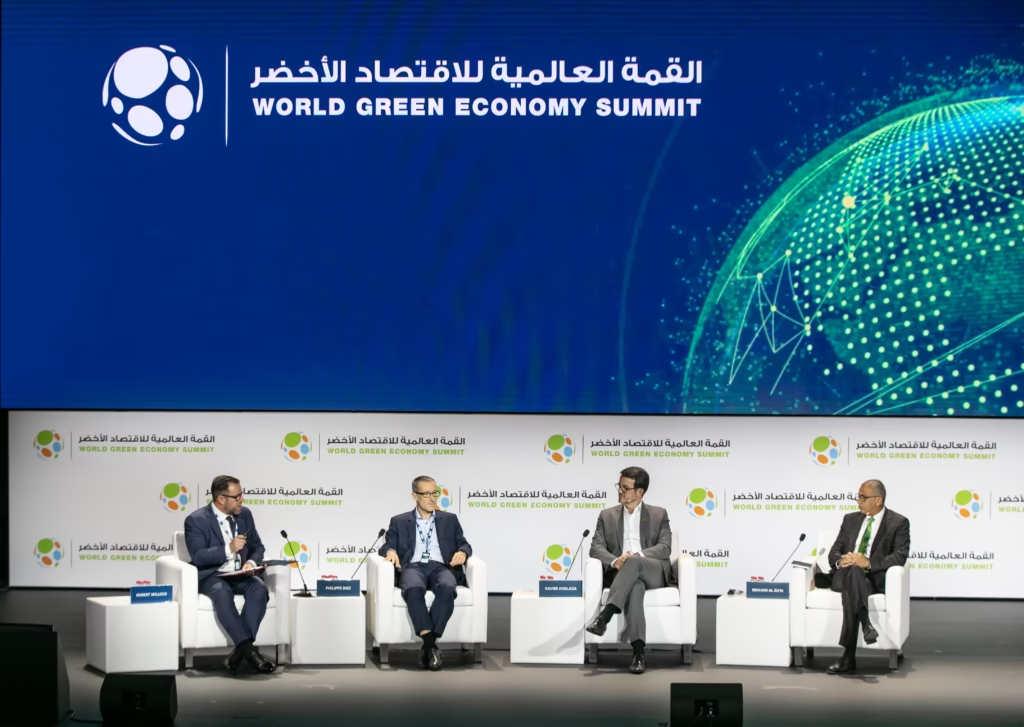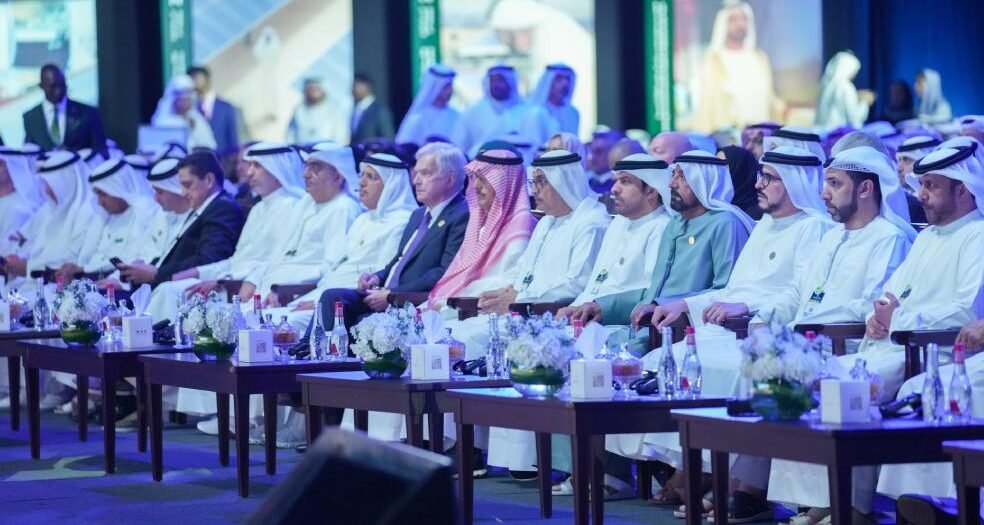The World Green Economy Summit 2025 opened its doors in Dubai with an unprecedented gathering of global leaders, innovators, policymakers, and experts, all united under the theme Innovating for Impact Accelerating the Future of the Green Economy. Held over two days, the summit showcased Dubai’s dedication to sustainable development and its ambition to become a global hub for green innovation.
This year, the summit attracted thousands of participants from around the world. Delegates from over 30 countries converged to discuss transformative strategies, share insights, and forge partnerships aimed at accelerating the transition to a sustainable and inclusive global economy. The event highlighted the UAE’s role as a pioneer in driving climate action and sustainable development while creating an ecosystem where innovation and business opportunities can thrive.
A Platform for Global Collaboration
The World Green Economy Summit 2025 serves as a pivotal platform for global collaboration. The summit provides a space where governments, private sector leaders, NGOs, and innovators come together to share knowledge and explore solutions to the pressing environmental challenges facing the world today.

Discussions focused on renewable energy, circular economies, sustainable urban development, green finance, and equitable climate strategies. Participants emphasized the importance of transparency and accountability, ensuring that sustainability pledges translate into meaningful outcomes.
The summit also reinforced the critical role of collective action. While individual nations can make significant progress in reducing emissions and fostering sustainability, global challenges like climate change demand coordinated solutions and shared commitments. The summit provided a framework for such cooperation, encouraging cross border partnerships and knowledge exchange.

Key Highlights from WGES 2025
Green Finance Takes Center Stage
One of the central themes of the summit was green finance. Ministers and senior executives from the financial sector discussed innovative ways to fund sustainable projects and encourage investment in green initiatives.
The summit explored the creation of financial instruments designed to attract private investment for projects that promote environmental sustainability. Green bonds, sustainable investment funds, and public private partnerships were among the topics emphasized as critical tools for mobilizing capital toward low carbon solutions.
Participants highlighted the importance of aligning investment strategies with environmental goals, ensuring that funding supports projects that reduce emissions, conserve resources, and promote long term economic resilience. Green finance is not just an economic tool but also a catalyst for systemic change, allowing governments and businesses to scale up sustainability initiatives globally.
Youth Engagement and Innovation
A standout feature of the summit was its focus on youth engagement. Young innovators were given a platform to showcase solutions that address climate change, resource scarcity, and environmental degradation.
These emerging leaders presented ideas spanning clean energy, waste management, sustainable agriculture, and digital solutions for environmental monitoring. Their contributions underscored the critical role of intergenerational collaboration in tackling climate challenges.
The summit highlighted that the youth of today are the decision makers and innovators of tomorrow. By providing them with resources, mentorship, and a global platform, the World Green Economy Summit 2025 fosters creativity and inspires actionable solutions that can have a real world impact.
Strategic Partnerships for Sustainable Development
The summit emphasized the importance of partnerships in driving sustainable development. Governments, businesses, and civil society organizations engaged in dialogues to explore how collaboration can accelerate the implementation of green technologies and sustainable practices.
Strategic partnerships fostered during the summit are expected to lead to tangible outcomes, such as joint investments in renewable energy projects, development of smart cities, and the creation of sustainable supply chains. These collaborative efforts demonstrate that achieving global sustainability goals requires cooperation across all sectors and regions.
Participants highlighted successful examples where partnerships have transformed industries, reduced carbon footprints, and improved resource efficiency. The summit encouraged replication of these models on a broader scale, emphasizing that collaboration is the key to scaling impact.

The UAE’s Role in Advancing the Green Economy
The UAE has emerged as a global leader in sustainable development. Through initiatives like climate funds, renewable energy projects, and international collaborations, the country has demonstrated its commitment to a green future.
Dubai, in particular, has positioned itself as a hub for innovation, investment, and climate action. Its hosting of international forums, including the World Green Economy Summit 2025, reflects its vision of driving global sustainability efforts while promoting economic growth and technological advancement.
The UAE has also been at the forefront of mobilizing capital for sustainable development. By creating climate funds and fostering partnerships with global financial institutions, the UAE aims to support projects that address environmental challenges, particularly in regions where resources are limited. These initiatives not only contribute to global climate goals but also create opportunities for sustainable growth and innovation.
Renewable Energy and Clean Technologies
Renewable energy was another major focus of the summit. Experts shared insights on the latest advancements in solar, wind, and hydrogen technologies. Discussions emphasized the need to accelerate the deployment of clean energy solutions to reduce reliance on fossil fuels and cut greenhouse gas emissions.
The summit also highlighted the importance of technology transfer and knowledge sharing. By providing access to state of the art technologies and expertise, developed nations can support emerging economies in achieving sustainable growth. This approach ensures that progress toward a green economy is inclusive and equitable.
Participants discussed strategies to make renewable energy more accessible, affordable, and scalable. Innovations such as decentralized energy grids, smart energy management systems, and energy storage solutions were highlighted as critical enablers of a sustainable energy future.
Circular Economy and Resource Efficiency
The World Green Economy Summit 2025 emphasized the importance of a circular economy. Unlike traditional linear models, which follow a take make dispose approach, a circular economy focuses on reducing waste, reusing resources, and recycling materials.
Delegates discussed policies and business models that can support a shift toward circular systems. Topics included sustainable packaging, industrial symbiosis, and product lifecycle management. By adopting circular principles, businesses can reduce environmental impact while creating new economic opportunities.
Resource efficiency was another key theme. From water management to energy optimization, participants explored how efficient use of resources can mitigate environmental risks and improve resilience. The summit showcased successful case studies from around the world, providing models for replication and adaptation.
Urban Sustainability and Smart Cities
Urban sustainability was a central discussion point at the summit. Cities are both major contributors to climate change and critical centers for implementing sustainable solutions.
Participants explored the concept of smart cities, which leverage technology to optimize energy use, reduce emissions, and enhance quality of life. Smart transportation systems, energy efficient buildings, and integrated waste management solutions were highlighted as essential components of sustainable urban development.
Dubai’s own projects in smart city development were showcased as examples of how innovation and strategic planning can create sustainable urban environments. The city’s initiatives demonstrate that integrating technology with policy and infrastructure planning can lead to significant environmental benefits and improve citizens’ quality of life.

The Role of Policy and Governance
Policy and governance play a critical role in shaping a green economy. Summit discussions emphasized the need for clear regulations, incentives, and frameworks that support sustainability goals.
Governments were encouraged to adopt policies that facilitate renewable energy adoption, promote sustainable agriculture, and incentivize low carbon technologies. Transparency, accountability, and data driven decision making were highlighted as essential elements for effective governance in the green economy.
International cooperation in policy development was also discussed. By harmonizing standards, sharing best practices, and coordinating climate action, countries can accelerate progress toward global sustainability targets.
Building a Resilient Future
The World Green Economy Summit 2025 underscored the urgent need to build resilience in the face of climate change. Extreme weather events, resource scarcity, and environmental degradation are challenges that require proactive and adaptive solutions.
Participants highlighted strategies to enhance resilience, including sustainable infrastructure, climate smart agriculture, disaster preparedness, and ecosystem restoration. By investing in resilience, nations can protect communities, safeguard economies, and ensure long term sustainability.
The summit also emphasized the social dimension of sustainability. Policies and initiatives must address inequalities, ensure equitable access to resources, and empower communities to participate in climate action. A resilient green economy is one that benefits both people and the planet.
Looking Ahead The Path to Global Sustainability
The World Green Economy Summit 2025 concluded with a strong message of hope and collaboration. Leaders reaffirmed their commitment to accelerating the global transition to a sustainable and inclusive economy.
The partnerships formed, ideas shared, and initiatives launched during the summit are expected to drive tangible outcomes in the coming years. From renewable energy projects to youth led innovations, the summit demonstrated that collective action and shared vision can create meaningful impact.
Dubai’s role in hosting the summit highlights its strategic position as a center for global climate action. By facilitating dialogue, innovation, and investment, the city continues to demonstrate leadership in advancing the green economy and shaping a sustainable future for all.
The World Green Economy Summit 2025 has set a new benchmark for international collaboration on sustainability. Its focus on innovation, partnerships, and inclusivity ensures that the global transition to a green economy will be dynamic, equitable, and impactful. The summit’s outcomes will continue to influence policies, business strategies, and investment decisions worldwide, creating a roadmap for a resilient and sustainable future.
Do follow UAE Stories on Instagram
Read Next – E& Enterprise Sets Unmatched Standards for CX Excellence Across UAE












